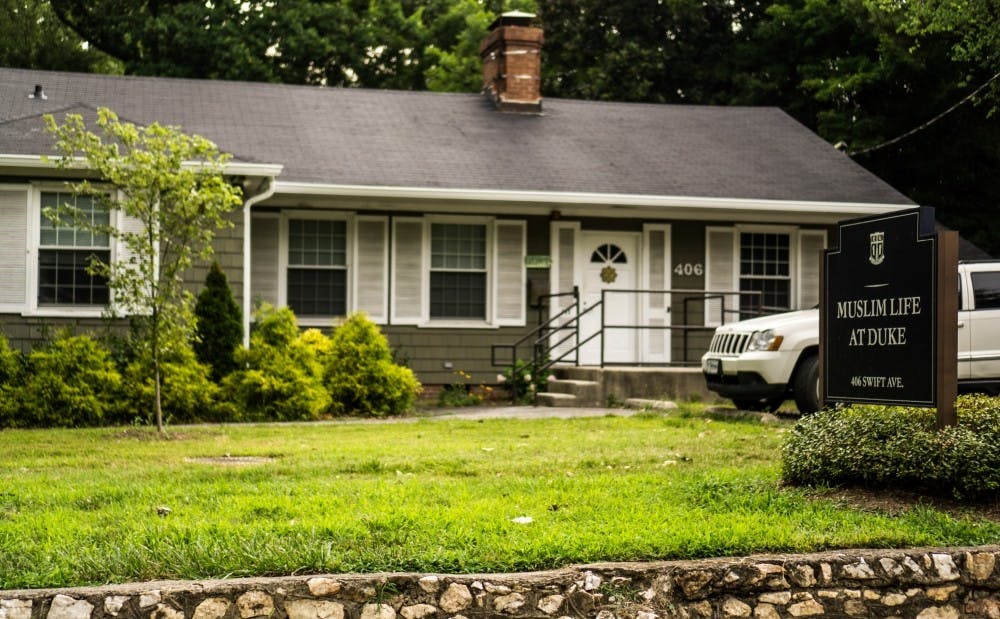Muslim student leaders at Duke were frustrated by the University's decision to reject their recommended candidate for Muslim chaplain.
At the beginning of the Spring semester, the Office of Student Affairs began its search for a Muslim chaplain, according to a statement from the Duke Muslim Students Association executive board. The statement explained that the executive board and the chaplain selection committee settled on someone “who instantly connected with [their] community.” However, that candidate was rejected.
“Finding a chaplain that is able to tend to a diverse student body encompassing Muslims of different backgrounds and viewpoints makes the search for a great chaplain even harder,” the statement read. “We entered our search with Student Affairs with high hopes, but the administration rejected our favored candidate without any real explanation. From the beginning of the search process, administration effectively made it clear that Muslim students’ needs were not the main priority in finding a Muslim chaplain.”
According to their statement, when the MSA pushed the University for transparency in the decision, they were met with “threatening” language, which was included at the bottom of an email sent in March by Zoila Airall, associate vice president of student affairs for campus life. It was below the signature of her original email, suggesting that it wasn’t a part of her actual response but rather advice sent to her from another administrator. Airall did not respond to The Chronicle's request for comment.
“I know it's futile, but you could remind them that [the Center for Muslim Life] and the chaplain's position exist because Student Affairs partnered with the Dean of the Chapel to create them and now we fully fund them. Our commitment is firm and though we may disagree this time on the ideal person, we remain steadfast in that commitment,” read the comment from an unknown author.
The MSA executive board’s statement listed frustrations the executive board had with the email, pointing to its self-congratulatory nature.
“Let us make this abundantly clear–threats of defunding towards students are absolutely unacceptable and give no good impression of how members of administration view the Muslim students they are meant to be serving,” the statement read. “Just as there would be no chaplain without Duke, there would be no chaplain without Muslim students–and it is frustrating that the administration assumes it can take pride in symbolically supporting Muslim students while turning down opportunities to actually support us.”
Later, the students also reached out to Larry Moneta, vice president for student affairs, to seek a more detailed response as to why their candidate for chaplain was rejected. He sent them an email with potential explanations for the administration’s choice.
“First and foremost are the needs of the particular community the person will serve. But, the selected individual has to meet institutional need as well, which will include various managerial, fiscal and organizational requirements,” his email read. “I offer this not to critique any of the candidates whom you've seen, but only to say that we must continue to work together to find that outstanding individual who will satisfy all our requirements and will serve the Duke Muslim and broader community, preferably for quite some time. We can't afford the frequent turnover we've seen in the role and while further delays are clearly disappointing and frustrating, the short-term further inconvenience will have been worth it when we find that superb person who will serve all of us for many years to come.”
Another criticism the MSA executive board had was with the job description for the chaplaincy position. According to their statement, they were told that they would be able to provide input for the official job description and participated in a community forum for Muslim students to voice their priorities for the chaplain position. The Chronicle reached out to Moneta for comment regarding this issue, as well as their other complaints.
“I appreciate and understand the concerns and frustrations expressed by the students and we are are fully committed to finding the best possible chaplain for our Muslim community,” Moneta wrote in an email Monday.
The statement from the MSA executive board also placed the incident in the context of the national political climate and previous incidents regarding their community. Additionally, they referred to the University’s decision to reverse a Muslim call-to-prayer two years ago.
“...during the 2016 Presidential campaign, Duke administrators made it increasingly difficult for us to hire a full-time chaplain when Muslim students needed more support than ever. This confirms to us that the needs of Duke’s Muslim students are not a priority,” the statement read. “Our community is exhausted. We are vulnerable and under attack. The Muslim students on campus have lived through repeated instances of wrongdoing in the past four years, both in and off campus.”
Read the full statement from the MSA executive board:
Duke MSA Executive Board Statement by thedukechronicle on Scribd
Get The Chronicle straight to your inbox
Signup for our weekly newsletter. Cancel at any time.
Class of 2019
Editor-in-chief 2017-18,
Local and national news department head 2016-17
Born in Hyderabad, India, Likhitha Butchireddygari moved to Baltimore at a young age. She is pursuing a Program II major entitled "Digital Democracy and Data" about the future of the American democracy.

